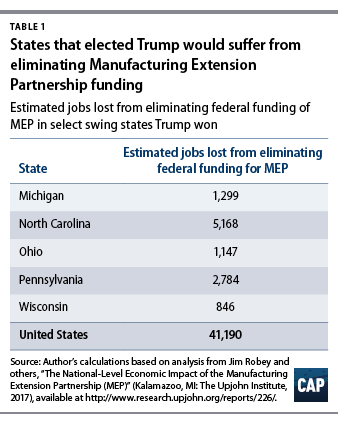In the weeks after Election Day, media outlets tirelessly amplified President Donald Trump’s misleading claim that he personally saved hundreds of jobs at a facility operated by Indiana-based appliance manufacturer Carrier. Will those outlets devote the same zeal to covering widespread program cuts outlined in Trump’s budget proposal that would undermine a public-private partnership supporting tens of thousands of jobs in the United States?
Mainstream and conservative media outlets alike heaped praise on Trump for his supposed role in brokering a deal to keep Carrier jobs in the U.S., and national news spent months hyping Trump’s mythical dealmaking skills after he claimed credit for other companies investing in the American economy. In fact, a Media Matters analysis of broadcast and cable news coverage of the economy found that Trump’s misleading boasts about brokering deals to create a handful of American jobs dominated economic news coverage in the last three months of 2016.
On March 16, the Trump administration produced a budget outline for the 2018 fiscal year that attempts to offset an unnecessary $54 billion increase in military spending by drastically reducing all remaining nondefense discretionary expenditures.
Among the programs set to lose funding is the Department of Commerce’s Manufacturing Extension Partnership (MEP) -- a public-private program dedicated to improving manufacturing efficiency. Washington Post reporter Danielle Paquette described the MEP as “a modest operation that exists solely to help small and medium-size companies create and maintain good-paying American manufacturing jobs” and noted that it has “long enjoyed bipartisan support.” And recent analyses of the program from the W.E. Upjohn Institute for Employment Research and the Center for American Progress (CAP) unveiled the extent to which cutting the MEP could imperil American workers.
According to a March 3 report from Upjohn, the MEP directly supports about 86,000 jobs nationwide, including 2,100 in Indiana. The total jobs number stretches to roughly 142,000 if you account for positions indirectly supported by MEP grants. Most importantly, more than 27,000 of the jobs directly and indirectly supported by the MEP are in the manufacturing sector -- an industry Trump has claimed his policies would help revitalize.
A March 27 analysis of the Upjohn report by CAP's associate director for economic policy, Brendan Duke, revealed that roughly half of the more than 80,000 jobs directly supported by the MEP could be in jeopardy if companies lose access to federal grant money in the wake of Trump’s budget cuts.** More than 11,000 of those jobs would be lost in Michigan, North Carolina, Ohio, Pennsylvania, and Wisconsin -- manufacturing-heavy swing states that went for Trump in 2016:

As CAP demonstrates, the number of jobs that could be lost thanks to Trump is many times more than the 800 he “saved” in the vaunted Carrier deal last December. Following the logic in CAP’s analysis, the loss of MEP funding could cost the state of Indiana roughly 1,000 jobs -- meaning the federal budget cut would cost the state at least as many jobs as it saved through a generous taxpayer-funded kickback to the appliance manufacturer:

Professional economists from across the political spectrum have slammed Trump’s economic policy vision for months and warned that his policies are more likely to harm the job market than revitalize it. Some outlets seem to have caught on to the fact that the president’s boasts about his role in making deals and creating jobs cannot be taken seriously. But their willingness to tackle the disastrous consequences of the Trump administration’s policy priorities is still developing.
**The Center for American Progress' analysis focuses only on the jobs directly supported by the MEP, according to the Upjohn Institute report, and does not include 4,161 jobs affected by MEP grants in Puerto Rico.